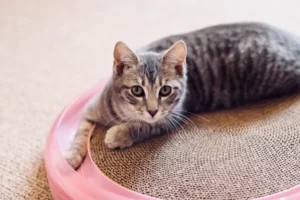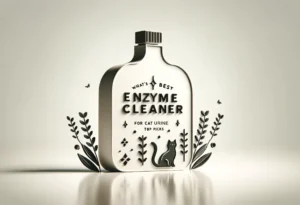Cats are infamous for their strong urine odor, often attributed to the accumulation of ammonia. But why exactly does a cat accumulate ammonia and how does it affect them?
Cats possess a unique metabolic process that results in the accumulation of ammonia in their bodies. This can be due to various factors such as diet, hydration levels, and overall health. Understanding the reasons behind this accumulation is crucial in ensuring the well-being of our feline friends.
Metabolic Process of Cats and Ammonia Production
Cats, like all living creatures, undergo metabolic processes that help them break down food for energy. During this process, protein digestion plays a crucial role. When cats consume protein-rich foods, their bodies break down the protein into amino acids, some of which contain nitrogen.
The liver then processes these amino acids and converts the excess nitrogen into ammonia, a toxic compound that needs to be eliminated from the body. Normally, cats eliminate ammonia through their urine. However, if there is an issue with the liver or kidney function, or if the cat’s diet is too high in protein, ammonia can accumulate in their system.
Impact of Ammonia Accumulation on Cats’ Health
The buildup of ammonia in a cat’s body can have serious consequences on their health and well-being. High levels of ammonia can lead to ammonia toxicity, which can cause symptoms such as lethargy, poor appetite, vomiting, and even neurological issues.
Moreover, ammonia toxicity can also affect a cat’s liver and kidney function, leading to organ damage. Over time, this can result in chronic health issues and reduced quality of life for the cat.
To prevent ammonia accumulation in cats, it is essential to ensure they have a balanced diet, adequate hydration, and regular veterinary check-ups to monitor their liver and kidney function. If you notice any symptoms of ammonia toxicity in your cat, it is crucial to seek veterinary care promptly to address the issue and prevent further health complications.
For more detailed information on the impact of ammonia accumulation on cats’ health, you can refer to this informative article by the American Association of Feline Practitioners.
Importance of Proper Hydration in Ammonia Regulation
Ensuring your cat stays properly hydrated is crucial in regulating their ammonia levels. Ammonia buildup occurs when cats do not have enough water to flush out toxins effectively. By encouraging your feline friend to drink an adequate amount of water, you help maintain their overall health and prevent ammonia accumulation in their system.
To keep your cat hydrated, provide fresh water daily in a clean bowl. Consider using a water fountain to entice them to drink more. Wet food also contributes to their hydration levels, as it contains moisture essential for their well-being. Monitor your cat’s water intake, especially during hot weather or if they have a health condition that may affect their hydration levels.
Remember, proper hydration plays a significant role in keeping your cat’s body functioning optimally. By staying on top of their water intake, you help manage their ammonia levels and promote their overall health and well-being.
Dietary Factors and Ammonia Accumulation
Your cat’s diet plays a crucial role in managing ammonia accumulation in their body. Foods high in protein can lead to increased ammonia production during digestion. While protein is essential for cats, excessive amounts can strain their liver and kidneys, contributing to elevated ammonia levels.
To help regulate your cat’s ammonia levels through their diet, consider feeding them high-quality, balanced meals with moderate protein content. Look for cat food brands that prioritize quality ingredients and provide a well-rounded nutritional profile. Avoid overfeeding protein-rich foods and opt for a balanced diet that meets your cat’s specific dietary needs.
Additionally, incorporating fiber-rich foods into your cat’s diet can help promote healthy digestion and reduce the risk of excessive ammonia buildup. Consult with your veterinarian to determine the most suitable diet for your cat based on their individual health requirements.
By being mindful of your cat’s dietary choices and selecting foods that support their overall well-being, you can effectively manage their ammonia levels and promote a healthier lifestyle for your furry companion.
Environmental Factors and Ammonia Odor
Ever wondered why your cat’s litter box sometimes emits that strong ammonia smell? Well, environmental factors play a significant role. Maintaining cleanliness in the litter box is crucial. Make sure to scoop it daily and change the litter regularly to prevent the build-up of ammonia. Proper ventilation is also key in reducing the concentration of ammonia in your home. Ensure there is adequate airflow in the area where the litter box is placed to help dissipate any odors. By addressing these environmental factors, you can minimize the presence of ammonia in your cat’s living space.
Ammonia Detection and Monitoring
Detecting and monitoring levels of ammonia in your cat’s environment is essential for their health and well-being. One way to detect elevated levels of ammonia is through your sense of smell. If you notice a strong, pungent odor around the litter box area, it may indicate high levels of ammonia. Another method is to use an ammonia detector, which can provide accurate readings of the ammonia concentration in the air. To reduce ammonia levels, consider using an air purifier with a filter specifically designed to capture ammonia particles. Additionally, placing bowls of vinegar near the litter box can help absorb the ammonia odor. By staying vigilant and proactive in monitoring and reducing ammonia levels, you can create a healthier living environment for your feline friend.
Tips to Reduce Ammonia:
- Regular Cleaning: Clean the litter box daily and replace litter frequently.
- Proper Ventilation: Ensure there is good airflow around the litter box area to prevent ammonia build-up.
- Use Ammonia Absorbers: Consider using products like baking soda, activated charcoal, or specialized ammonia absorbers near the litter box to reduce odors effectively.
For further information on maintaining a healthy environment for your cat, check out this resource on indoor air quality and pet health: Indoor Air Quality & Pet Health
Natural Ways to Reduce Ammonia Accumulation
Cats naturally accumulate ammonia in their bodies through the breakdown of proteins in their diet. This can sometimes lead to issues such as overburdening the liver or affecting their urinary tract health. Here are some natural ways to help reduce this accumulation and support your feline friend’s well-being:
1. Increase Water Intake: Encourage your cat to drink more water by providing fresh water sources around the house or adding wet food to their diet. This can help flush out toxins, including excess ammonia, from their system.
2. Provide Quality Protein: Ensure your cat is getting high-quality protein sources in their diet. Opt for lean meats or balanced commercial cat foods to minimize excessive ammonia production in their body.
3. Clean Litter Box Regularly: Ammonia can build up in the litter box, so it’s important to scoop it out regularly to prevent your cat from being exposed to high levels of this compound.
4. Air Circulation: Good ventilation in your home can help reduce the concentration of ammonia in the air, benefiting both you and your cat.
5. herbal remedies: Certain herbs like parsley or dandelion can support the liver and kidneys, helping to process and eliminate ammonia more effectively from your cat’s body.
Fun Facts about Cats and Ammonia
Cats have a unique ability to tolerate higher levels of ammonia in their bodies compared to other animals. This is because their kidneys are efficient at filtering out toxins, allowing them to excrete excess ammonia through their urine. Here are some fun facts about cats and their relationship with ammonia:
1. Ammonia Detection: Cats have a strong sense of smell and can detect even trace amounts of ammonia in their environment. This is why they may be sensitive to certain cleaning products that contain ammonia.
2. Grooming Rituals: Cats spend a significant amount of time grooming themselves, which helps remove ammonia and other toxins from their fur. This self-cleaning behavior is essential for maintaining their overall health.
3. Ammonia-Related Behaviors: Some cats may exhibit unusual behaviors when exposed to high levels of ammonia, such as excessive scratching or urinating outside the litter box. It’s important to address the root cause of these behaviors to ensure your cat’s well-being.
4. Unique Physiology: Cats have a specialized liver enzyme called urease that helps break down urea into ammonia. This adaptation allows them to efficiently process protein-rich diets but can also lead to higher levels of ammonia buildup if not properly managed.
5. Regular Vet Check-Ups: Monitoring your cat’s health through regular vet check-ups can help detect any underlying issues related to ammonia accumulation early on. This proactive approach can prevent potential health problems down the road.
For more information on cat health and care, you may refer to the American Association of Feline Practitioners’ website: https://catvets.com/
Alex, a passionate animal lover, has experience in training and understanding animal behavior. As a proud pet parent to two dogs and three cats, he founded AnimalReport.net to share insights from animal experts and expand his knowledge of the animal kingdom.




